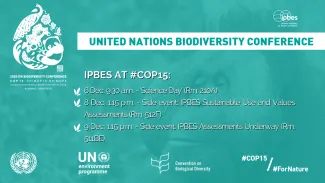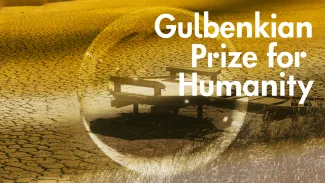
Media Release: IPBES Values Assessment - Decisions Based on Narrow Set of Market Values of Nature Underpin the Global Biodiversity Crisis
Issued by the IPBES Secretariat on 11 July 2022
- Find the Summary for Policymakers here.
- Summary for Policymakers, photos, ‘B-roll’ & media resources: https://bit.ly/ValuesMediaPack
- Media release also available in French: https://bit.ly/ValuesFrench & Spanish: https://bit.ly/ValuesSpanish
- Media launch webcast live from Bonn, Germany: www.bit.ly/ValuesRelease starts at 2 p.m. (Berlin time – CEST) / 8 a.m. (US EDT) / 1 p.m. (London – BST) on Monday, 11 July
- For interviews: [email protected] or +1-416-878-8712 or +49-176-212-09437
Decisions Based on Narrow Set of Market Values of Nature Underpin the Global Biodiversity Crisis
More than 50 Methods & Approaches Exist to
Make Visible the Diverse Values of Nature
The way nature is valued in political and economic decisions is both a key driver of the global biodiversity crisis and a vital opportunity to address it, according to a four-year methodological assessment by 82 top scientists and experts from every region of the world.
Approved on Saturday, by representatives of the 139 member States of the Intergovernmental Science-Policy Platform on Biodiversity and Ecosystem Services (IPBES), the Assessment Report on the Diverse Values and Valuation of Nature finds that there is a dominant global focus on short-term profits and economic growth, often excluding the consideration of multiple values of nature in policy decisions.
Economic and political decisions have predominantly prioritised certain values of nature, particularly market-based instrumental values of nature, such as those associated with food produced intensively. Although often privileged in policymaking, these market values do not adequately reflect how changes in nature affect people’s quality of life. Furthermore, policymaking overlooks the many non-market values associated with nature’s contributions to people, such as climate regulation and cultural identity.
“With more than 50 valuation methods and approaches, there is no shortage of ways and tools to make visible the values of nature,” said Prof. Unai Pascual (Spain/Switzerland), who co-chaired the Assessment with Prof. Patricia Balvanera (Mexico), Prof. Mike Christie (UK) and Dr. Brigitte Baptiste (Colombia). “Only 2% of the more than 1,000 studies reviewed consult stakeholders on valuation findings and only 1% of the studies involved stakeholders in every step of the process of valuing nature. What is in short supply is the use of valuation methods to tackle power asymmetries among stakeholders, and to transparently embed the diverse values of nature into policymaking.”
Deeply cross-disciplinary and, based on a large review conducted by experts in social science, economics and the humanities, the Values Assessment draws on more than 13,000 references – including scientific papers and information sources from indigenous and local knowledge. It also builds directly on the 2019 IPBES Global Assessment, which identified the role of economic growth as a key driver of nature loss, with 1 million species of plants and animals now at risk of extinction.
To help policymakers better understand the very different ways in which people conceive and value nature, the Report provides a novel and comprehensive typology of nature’s values. The typology highlights how different worldviews and knowledge systems influence the ways people interact with and value nature.
In order to make this typology useful for decision-making, the authors present four general perspectives. These are: living from, with, in and as nature. Living from nature emphasizes nature’s capacity to provide resources for sustaining livelihoods, needs and wants of people, such as food and material goods. Living with nature has a focus on life ‘other than human’ such as the intrinsic right of fish in a river to thrive independently of human needs. Living in nature refers to the importance of nature as the setting for people’s sense of place and identity. Living as nature sees the natural world as a physical, mental and spiritual part of oneself.
The Report finds that the number of studies that value nature has increased on average by more than 10% per year over the last four decades. The most prominent focus of recent (2010-2020) valuation studies has been on improving the condition of nature (65% of valuation studies reviewed) and on improving people’s quality of life (31%), with just 4% focused on improving issues around social justice. 74% of valuation studies focused on instrumental values, with 20% focused on intrinsic values, and just 6% focused on relational values.
“The Values Assessment provides decision-makers with concrete tools and methods to better understand the values that individuals and communities hold about nature,” said Prof. Balvanera. “For example, it highlights five iterative steps to design valuation to fit the needs of different decision-making contexts. The report also provides guidelines on how to enhance the quality of valuation by taking into account relevance, robustness and resource requirements of different valuation methods.”
“Different types of values can be measured using different valuation methods and indicators. For example, a development project can yield economic benefits and jobs, for which instrumental values of nature can assessed, but it can also lead to loss of species, associated with intrinsic values of nature, and the destruction of heritage sites important for cultural identity, thus affecting relational values of nature. The report provides guidance for combining these very diverse values.”
“Valuation is an explicit and intentional process,” said Prof. Christie. “The type and quality of information that valuation studies can produce largely depends on how, why and by whom valuation is designed and applied. This influences whose and which values of nature would be recognized in decisions, and how fairly the benefits and burdens of these decisions would be distributed.”
“Recognizing and respecting the worldviews, values and traditional knowledge of indigenous peoples and local communities allows policies to be more inclusive, which also translates into better outcomes for people and nature”, said Dr. Baptiste. “Also, recognizing the role of women in the stewardship of nature and overcoming power asymmetries frequently related to gender status, can advance the inclusion of the diversity of values in decisions about nature.”
The Report finds that there are a number of deeply held values that can be aligned with sustainability, emphasizing principles like unity, responsibility, stewardship and justice, both towards other people and towards nature. “Shifting decision-making towards the multiple values of nature is a really important part of the system-wide transformative change needed to address the current global biodiversity crisis,” said Dr. Balvanera. “This entails redefining ‘development’ and 'good quality of life’ and recognising the multiple ways people relate to each other and to the natural world.”
The authors identify four values-centred ‘leverage points’ that can help create the conditions for the transformative change necessary for more sustainable and just futures:
- Recognizing the diverse values of nature
- Embedding valuation into decision-making
- Reforming policies and regulations to internalize nature’s values
- Shifting underlying societal norms and goals to align with global sustainability and justice objectives
“Our analysis shows that various pathways can contribute to achieve just and sustainable futures. The report pays specific attention to future pathways related to ‘green economy’, ‘degrowth’, ‘Earth stewardship’, and ‘nature protection’. Although each pathway is underpinned by different values, they share principles aligned with sustainability,” added Prof. Pascual. “Pathways arising from diverse worldviews and knowledge systems, for instance those associated with living well and other philosophies of good living, can also lead towards sustainability.”
Among the other tools offered by the Report to strengthen the consideration of greater diversity of values of nature in decision-making are: an exploration of entry points for valuation across all parts of the policy cycle; six interrelated values-centred guidelines to promote sustainability pathways; an evaluation of the potential of different environmental policy instruments to support transformative change towards more sustainable and just futures by representing diverse values, and a detailed illustration of the required capacities of decision makers to foster the consideration and embedding of the diverse values of nature into decisions.
“Biodiversity is being lost and nature’s contributions to people are being degraded faster now that at any other point in human history,” said Ana María Hernández Salgar, Chair of IPBES. “This is largely because our current approach to political and economic decisions does not sufficiently account for the diversity of nature’s values. The IPBES Values Assessment is being released at an extremely important time – just in advance of the expected agreement later this year by the Parties to the Convention on Biological Diversity on a new global biodiversity framework for the next decade. The information, analysis and tools offered by the Values Assessment make an invaluable contribution to that process, to the achievement of the Sustainable Development Goals and to shifting all decisions towards better values-centred outcomes for people and the rest of nature.”
- ENDS -
Please note: This French/Spanish version of the media release is being provided as a courtesy translation for media. It is possible that some terminology may still change, based on official translations to still be completed. In the event of a discrepancy between this version and the English version of the media release, the English version should be regarded as definitive.
Note to Editors:
For enquiries and interviews please contact:
The IPBES Media Team
[email protected]
www.ipbes.net
+1-416-878-8712 or +49-176-212-09437
IPBES has now released the Summary for Policymakers (SPM) of the Diverse Values and Valuation of Nature report. The SPM presents the key messages and policy options, as approved by the IPBES Plenary. To access the SPM, photos, ‘B-roll’ and other media resources go to: https://bit.ly/ValuesMediaPack The full six-chapter Report (including all data) will be published later this year.
About IPBES:
Often described as the “IPCC for biodiversity”, IPBES is an independent intergovernmental body comprising 139 member Governments. Established by Governments in 2012, it provides policymakers with objective scientific assessments about the state of knowledge regarding the planet’s biodiversity, ecosystems and the contributions they make to people, as well as the tools and methods to protect and sustainably use these vital natural assets. For more information about IPBES and its assessments visit www.ipbes.net
Video introduction to IPBES: www.youtube.com/watch?v=oOiGio7YU-M
Additional videos:
- IPBES Global Assessment of Biodiversity and Ecosystem Services (2019): https://youtu.be/7eYK5ibTOMA
- IPBES Assessment of Land Degradation and Restoration (2018): www.youtube.com/watch?v=KCt7aai17Nk
- IPBES Regional Assessments of Biodiversity and Ecosystem Services (2018): www.youtube.com/watch?v=kR0HeepbWCc
- IPBES Assessment of Pollinators, Pollination and Food Production (2016): www.youtube.com/watch?v=YwkYbeiwK5A
- IPBES Assessment of Scenarios and Models of Biodiversity (2016): www.youtube.com/watch?v=wZfcDmtGa9I
By the Numbers – Key Statistics and Facts from the Report
- 10%: increase in the average annual number of valuation studies undertaken over the last four decades
- 65%: valuation applications reviewed (2010-2020) in which the most prominent focus has been on improving the status of nature, followed by improving people’s quality of life (31%), and improving social justice (4%)
- 74%: valuation applications among those reviewed in which ‘instrumental values’ (e.g., nature as an economic asset) were elicited (as opposed to relational and intrinsic values)
- 50%: valuation applications among those reviewed in which value indicators of biophysical measures predominate, followed by monetary and socio-cultural indicators
- 72%: reported valuations performed at the sub-national rather than national or global scales (with very few studies dealing with cross-regional or cross-national protected areas, or with explicit reference to indigenous peoples and local communities’ territories)
- 25%: ecological contexts of reviewed valuations with emphasis given to the value of nature’s contributions to people that come from forests vs. cultivated areas (16%) and inland water bodies (11%)
- +/-48,000: studies out of 79,000 (61%) that provided explicit geo-referenced information
- 56%: reviewed valuations that did not attempt to bring different values together, but instead used distinct biophysical, monetary and socio-cultural indicators
- +/-50%: valuation studies reviewed that bring different values together apply methods allowing values to be directly compared; the other half compare bundles of values, or use relative weights based on participants’ or valuation experts’ rankings or deliberation
- <1%: valuation studies reviewed that keep values separate (i.e., treat them in parallel in a deliberative process)
- 44%: valuation studies reviewed in which some stakeholder involvement was reported
- 1%: valuation studies reviewed that included stakeholder consultation and their involvement in every step of the valuation process
- 2%: valuation studies reviewed that reported consultations with stakeholders on findings
- 0.6%: valuation studies reviewed that explicitly account for power issues in the valuation process
- 5%: valuation studies reviewed that considered equity when aggregating impacts on individuals and social groups with diverse socio-economic conditions in valuation
- 53%: of 460 future scenarios reviewed explicitly articulate values, 42% mention values but do not assess them explicitly and 53% perform some kind of valuation without reflecting on underpinning values
IPBES Partner Comments
“The forthcoming IPBES Assessment Report on the Values and Valuation of Nature is timely. This ‘Values Assessment’ will help us better understand the different ways that people interact with and benefit from nature, and also help us grasp the way we can measure these.
Under the Convention, this nuanced understanding of values will provide a strong basis for better policy design at the national level, including mainstreaming, national planning, and economic policy, within the broader context of national policies for sustainable development. This year at COP 15, governments are expected to adopt a Global Biodiversity Framework that will allow the world to bend the curve on biodiversity loss and set us on a path of living in harmony with nature. Implementing the goals and targets in this Global Biodiversity Framework, which will complement 2030 Sustainable Development Agenda, absolutely is underpinned by knowledge of the different types of values of nature as demonstrated in the IPBES Values Assessment.
I applaud the work of all IPBES experts for this and look forward to its active use by all Parties and Stakeholders to the Convention.”
- Elizabeth Maruma Mrema, Executive Secretary, Convention on Biological Diversity (CBD)
“Nature is what sustains us all. It gives us food, medicine, raw materials, oxygen, climate regulation and so much more. Nature, in all its diversity, is the greatest asset that humanity could ever ask for. Yet its true value is often left out of decision making. Nature’s life support system has become an externality that doesn’t even make it onto the ledger sheet. And so, it is lost in the pursuit of short-term profit.
If we do not value nature and account for it in decision-making, it will continue to be lost. And that can only be bad news for humanity. Valuing nature is central to the success of the post-2020 Global Biodiversity Framework which is currently being negotiated by UN Member States.
It is for this reason that the Values Assessment report by IPBES, whose secretariat is hosted by UNEP, is so crucial. This report makes it clear that we must place science-based valuation of nature at the heart of economic decision making.
The UN has adopted the System of Environmental and Economic Accounting as the standard for countries’ national accounts. We must ensure that it is implemented around the world – to finally value nature for its incredible contribution and so protect it.”
- Inger Andersen, Executive Director, UN Environment Programme (UNEP)
“The diversity of cultural expressions is an extraordinary opportunity to understand how biodiversity is perceived across the globe, learn from each other and to imagine solutions. This IPBES assessment report on values is an important step towards this goal, to understand and change the way we relate to nature. Making peace with nature is a matter of behavioral change, ethics and values. Reconciliation is already happening in UNESCO sites across the globe, and these new relationships can be shared with the world. For this, we believe in the power of social and human sciences and education.”
- Audrey Azoulay, Director-General, UN Educational, Scientific and Cultural Organization (UNESCO)
“Resilient and productive ecosystems are the foundation of sustainable agrifood systems. A better understanding of nature’s multiple values and benefits is essential for proper decisions affecting the use and conservation of our natural resources. Policymakers need to weigh how their decisions will affect different components of biodiversity and different segments of society across the world and over time. This IPBES assessment report offers a wide range of options, perspectives and approaches to help integrate nature’s diverse values into policy.
The IPBES report findings will bolster efforts to achieve the Sustainable Development Goals, to address the impacts of the climate crisis, biodiversity loss and ecosystem degradation, and to open potential holistic pathways for better production, better nutrition, a better environment, and a better life for all, leaving no one behind.”
- QU Dongyu, Director-General, The Food and Agriculture Organization of the United Nations (FAO)
“The IPBES, the world’s premier mechanism for evidence-based policy dialogue on the relationship between people and nature, is launching its Assessment Report on the Values and Valuation of Nature. The report highlights a major gap between science and policy, with less than 5% of valuation studies finding their way into policy. As the post-2020 Global Biodiversity Framework is finalized, the Values Assessment is helping to close this longstanding gap by supporting decision-makers to choose and design appropriate valuation methods for nature. It also provides a much-needed roadmap for countries to operationalize their biodiversity commitments and the nature-dependent Sustainable Development Goals.”
- Achim Steiner, Administrator, United Nations Development Programme (UNDP)






